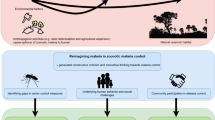Abstract
Research in control of tick-borne diseases and trypanosomosis, and their vectors, namely, ticks and tsetse flies respectively, has been on going for decades. However, very little attention has been paid to the socio-economic factors that are likely to influence the outcome of the interventions in the control of these diseases. Thus, this study was designed to investigate these factors, mainly the intra-household factors influencing decision-making in the control of Vector-borne diseases in the pastoralist areas of Uganda. These factors included: indigenous technical knowledge, household economic factors, and gender. Both qualitative and quantitative methods were used in the collection and analysis of data. The tools used for data collection included among others, participatory learning and action (PLA), and Case studies. The findings included the following: In pastoralist households, a big proportion of the household budget was allocated to vector-borne diseases control. In the male-headed households, men dominated decision-making on vector-borne diseases control, although the goals and priorities of men and women in these households were not the same. Also, vector-borne disease control was predominantly by use of modern veterinary drugs, and pastoralists treated sick cattle by themselves even in situations where there were veterinary personnel.
Similar content being viewed by others
References
CHARYULU. A.S., 2007. Dissemination of Indigenous Knowledge: A way to Sustainable Agriculture. National Institute of Agricultural Management (MANAGE). http://www.manage.gov.in(Accessed July 2007).
FAO, 1995. Gender in rural development and population issues. Modules on gender, population and development with a special focus on land tenure. FAO cooperate document repository. www.fao.org/dorep (Accessed March 2007).
LANGILL, S. (2003) Introduction to Indigenous Knowledge. Permanent Agriculture Resources, Holualoa, USA. http://www.overstory.org (Accessed September 2003)
LINDLOF, T.R. (1995) Qualitative Communication Research Methods. Current Communication: An Advanced Text Series Volume 3, Sage Publications, Inc., California, 313pp.
MARCH, C., SMYTH, I., AND MUKHOPADHYAY, M (1999) Gender analytical frameworks. In: The guide to gender analytical frameworks. Oxfam, Oxford.
MARK, R. (1996) Research Made simple. A hand book for Social workers. Sage Publications Inc., California, 413 pp.
McCORKLE, C. (1997) Intersectional Health Care Delivery. In: The Ecology of Health, J. Chesworth, ed. Sage Publications, Thousand Oaks, CA, pp187-2000.
MOSER, C.O.N. (1999) Gender roles, the family and the household. In: Gender Planning and Development; theory, practice and training. pp15–36. London, Routledge.
PUTT, S.N.H., SHAW, A.P.M., WOODS, A.J., TYLER, L., and JAMES, A.D. (1987). Veterinary Epidemiology and Economics in Africa. A manual for use in the design and appraisal of livestock health policy. ILCA Manual No. 3. International Livestock Centre for Africa.
RHEA, Z.M., 2002. Raising Awareness of Indigenous Knowledge in Science and Technology Education. Policy Briefs. In: Science and Development Network (SciDevNet). http://www.scidev.net (Accessed July 2007)
SCOONES, I. AND THOMPSON, J. Eds (1994). Knowledge, power and agriculture-towards theoretical understanding. In: Beyond Farmer first. Intermediate Technology Publications Ltd, London, U.k. pp 16–31.
STRAUSS, A. and CORBIN, J. (1998) Basics of Qualitative Research. Techniques and Procedures for Developing Grounded Theory. Sage Publications, Inc., California, 312 pp.
WATERS-BAYER, A. AND BAYER, W. (1994) Planning with Pastoralists: PRA And more. A review of methods focused on Africa. GTZ Division 422 working paper.
WILLIAMS, D.L. and MUCHENA, O. N. (2003) Utilizing Indigenous Knowledge Systems in Agricultural Education to promote sustainable agriculture. Journal of Agricultural Education. http://www.overstory.org (Accessed September 2003).
Author information
Authors and Affiliations
Corresponding author
Rights and permissions
About this article
Cite this article
Mugisha, A., McLeod, A., Percy, R. et al. Socio-economic factors influencing control of vector-borne diseases in the pastoralist system of south western Uganda. Trop Anim Health Prod 40, 287–297 (2008). https://doi.org/10.1007/s11250-007-9093-2
Received:
Accepted:
Published:
Issue Date:
DOI: https://doi.org/10.1007/s11250-007-9093-2




